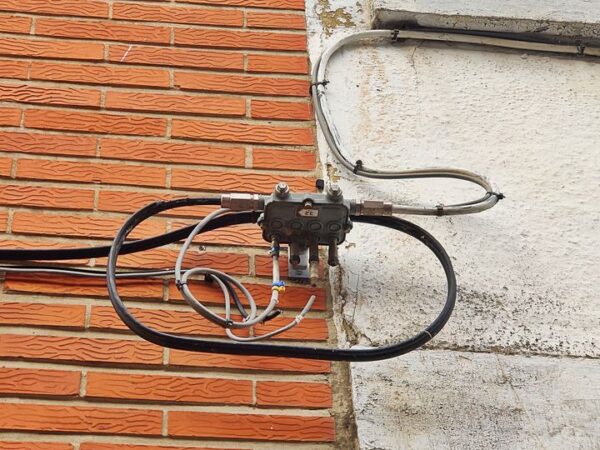Rules of procedure for submitting a complaint
CHAPTER I: Definitions
Definitions
End-user: a user not providing a public electronic communications network or publicly available electronic communications services, as defined in the Electronic Communications Act of 13 June 2005.
Consumer: any natural person who uses or requests a publicly available electronic communications service as defined in the Electronic Communications Act of 13 June 2005 for purposes which are outside his or her trade, craft or profession.
Telecommunications company (hereinafter “undertaking”): any operator; any natural or legal person compiling, selling or distributing a directory; any natural or legal person operating a directory enquiry service; any natural or legal person providing a public electronic communications network or publicly available electronic communications services, as defined in the Electronic Communications Act of 13 June 2005; any natural or legal person providing encryption services to the public; any natural or legal person offering other activities relating to electronic communications within the meaning of the Electronic Communications Act of 13 June 2005.
Qualified body: anybody, either private or created by a public authority, providing out-of-court legal dispute resolution and included in the list that is drawn up by the Federal Public Service Economy, SMEs, Self-Employed and Energy and submitted to the European Commission.
CHAPTER II: Handling of consumer disputes by undertakings
Article 1: Internal complaint handling service
In the event of a dispute, the end-user may submit a complaint directly to the service responsible for handling complaints within the telecommunications company concerned.
Article 2: Term and handling of complaints by undertakings
The company shall respond to complaints without delay and take due care to seek a satisfactory solution.
If a complaint is not resolved within a reasonable period, the undertaking shall provide the end-user, on its own initiative, with the contact details of the Office of the Ombudsman for Telecommunications, and specify that this body is a qualified entity.
This information is to be provided on paper or on another durable data carrier.
CHAPTER III The Office of the Ombudsman for Telecommunications
Article 3: Nature of the Office of the Ombudsman for Telecommunications
The Office of the Ombudsman for Telecommunications, which was set up within the Belgian Institute for Postal and Telecommunications Services by the Act of 21 March 1991 on the reform of certain public business companies, has powers regarding the relations between the end-user, within the meaning of the legislation in force on electronic communications, and the telecommunications companies. Within the limits of its competence the Office of the Ombudsman for Telecommunications shall not receive any instructions from any authority.
Article 4: The powers of the Office of the Ombudsman for Telecommunications
The Office of the Ombudsman for Telecommunications has the following missions:
- Examine all complaints by end-users related to the activities of telecommunications companies;
- Mediate in order to facilitate an amicable settlement for disputes between undertakings and end-users;
- Make a recommendation to the undertakings if an amicable settlement cannot be reached; a copy of the recommendation shall be sent to the complainant;
- Provide end-users who contact it verbally or in writing with the best possible information about their interests;
- Issue opinions within the framework of its missions, at the request of the Minister competent for telecommunications, of the Minister competent for consumer affairs or of the Belgian Institute of Postal Services and Telecommunications or of the Consultative Committee on Telecommunications (or of the Ministers competent for broadcasting and Community Regulators as regards broadcasting matters falling within the remit of the Office of the Ombudsman for Telecommunications);
- Examine the request from any person who claims to be the victim of a malicious use of an electronic communications network or service for information about the identity and address of the users of the electronic communications networks or services who have harassed this person, provided that this information is available. However, this type of request is not subject to these rules of procedure;
- Cooperate with:
a) other independent sector-specific dispute committees or independent mediators, among other things by referring complaints that do not fall within the brief of the Office of the Ombudsman for Telecommunications to the authorised dispute committee or mediator;
b) foreign ombudspersons or bodies functionally equivalent to them who act as an appeal body handling complaints falling within the brief of the Office of the Ombudsman for Telecommunications;
c) the community regulators.
Article 5: Procedural principles
The mediation procedure aims to reach an amicable settlement, free of charge and quickly, in the interest of both parties.
The Office of the Ombudsman for Telecommunications is independent and conducts the procedure in a transparent and impartial manner.
The parties and the Office of the Ombudsman for Telecommunications have to ensure that the parties’ privacy is guaranteed and that business and company secrets are not divulged to the public as a result of the mediation procedure. The persons within the entity who are in charge of the alternative dispute resolution are sworn to secrecy unless stated otherwise by law. The obligation regards all elements they become aware of during their mission.
CHAPTER IV: Complaint handling by the Office of the Ombudsman for Telecommunications
Article 6: Lodging a complaint with the Office of the Ombudsman for Telecommunications
A request for an out-of-court settlement of a dispute may be submitted to the Office of the Ombudsman for Telecommunications at its offices (after making an appointment), by letter (8, Boulevard du Roi Albert II, box 3 – 1000 Brussels), by fax (02 – 219 77 88), by e-mail (plaintes@mediateurtelecom.be) or by completing the form on the website of the Office of the Ombudsman for Telecommunications (www.mediateurtelecom.be).
Requests can be submitted in Dutch, French, German or English.
The procedure can be carried out in these languages.
Article 7: Legal framework
In the context of its mission, the Office of the Ombudsman relies on all legal provisions applicable to the specific case at issue. Without this list being exhaustive, the Office of the Ombudsman may base its activities on international treaties, European Directives or Regulations, Belgian legislation (Civil Code, Code of Economic Law, Electronic Communications Act of 13 June 2005, the Royal Decree laying down the obligations that apply to the provision of paying services, other sector legislation…) and codes of conduct (e.g. GOF).
Article 8: Completeness of the request
Once the Office of the Ombudsman for Telecommunications has all the documents necessary for the examination of the request’s admissibility, it shall inform the parties concerned of the receipt of the complete request and of the date of receipt.
If appropriate, the preliminary request submitted to the internal complaints handling service of the telecommunications company concerned as well as any actions taken in response to it, is attached to the request for alternative dispute resolution sent to the Office of the Ombudsman for Telecommunications.
Failing that, the end-user is invited to complete his/her request, using a durable data carrier within a term of ten calendar days. In the meantime the request shall not be taken up.
Article 9: Inadmissibility of the request for alternative dispute resolution
The Office of the Ombudsman for Telecommunications shall refuse to take up a request for alternative dispute resolution:
- If the complaint in question has not been submitted previously to the undertaking concerned;
- If the complaint in question was submitted to the undertaking concerned more than a year ago;
- If the complaint is concocted, vexatious or defamatory;
- If the complaint is anonymous or the other party is not identified or identifiable;
- If the complaint relates to a dispute which is or already has been the subject of judicial proceedings;
- If the complaint relates to a dispute which does not fall within the brief of the Office of the Ombudsman for Telecommunications;
- If the handling of the dispute would seriously impair the effective operation of the Office of the Ombudsman for Telecommunications.
Article 10: Free of charge
The handling of a request for alternative dispute resolution by the Office of the Ombudsman shall be free of charge for the end-user.
Article 11: Decision to continue or refuse the handling of the request for alternative dispute resolution & information for the parties
If the Office of the Ombudsman for Telecommunications decides to continue to handle the request for mediation, it shall inform the end-user and the undertaking of the following:
- That the procedure is carried out in compliance with the rules of procedure and that their content can be consulted on the website of the Office of the Ombudsman for Telecommunications and can be communicated on a durable data carrier;
- That by participating in the mediation procedure, the parties agree to the rules of procedure of the Office of the Ombudsman for Telecommunications;
- That the parties of the mediation procedure may be represented by an attorney or other person;
- That it is possible to end the reconciliation procedure on the grounds of Article 21;
- That the procedure is free of charge by virtue of Article 10;
- That the Office of the Ombudsman for Telecommunications respects the confidential nature of the information provided by the parties, pursuant to Article 17;
- That the participation in the procedure does not prevent a legal claim from being lodged following the completion of the procedure with the Office of the Ombudsman for Telecommunications;
- That the parties are free to accept or refuse the proposed amicable settlement (except in the case of a recommendation becoming enforceable for the undertaking – see Article 14);
- That this solution does not have technical or legal consequences (unless in the case of a recommendation becoming enforceable for the undertaking – see Article 14);
- That the mediation procedure may have a different outcome compared to a judicial procedure.
The information shall be communicated on a durable data carrier.
Article 12: Means for exchanging information
The parties may exchange information with the Office of the Ombudsman for Telecommunications by e-mail, by post or by fax. If the consumer so wishes, he/she may visit the premises of the Office of the Ombudsman for Telecommunications in person (after making an appointment).
The parties shall have a reasonable period to take cognizance of all documents, arguments and facts put forward by the other party. The term is defined in Article 13.
Article 13: Terms
The Office of the Ombudsman for Telecommunications shall notify the parties of the outcome of the dispute resolution procedure on a durable data carrier, within 90 calendar days of receipt of the complete application.
In exceptional circumstances, this term may be extended once, for an equivalent period, provided that the parties are informed of this prior to the expiry of the initial term, and that this extension is justified by the complexity of the dispute.
The parties shall have a period of ten calendar days to express their points of view (unless provided otherwise if a protocol of cooperation has already been signed with an undertaking). The same period will apply for taking cognizance of and responding to all documents, arguments and facts put forward by the other party or any request from the Office of the Ombudsman for Telecommunications (unless provided otherwise if a protocol of cooperation has already been signed with an undertaking).
Article 14: Closure of the case
When the Office of the Ombudsman for Telecommunications has obtained an amicable settlement, it closes the case and sends a confirmation to the parties in writing or on another durable data carrier.
If an amicable settlement cannot be reached, the Office of the Ombudsman for Telecommunications shall inform all parties, in writing or on another durable data carrier and may make a recommendation to the undertaking concerned, with a copy to the requesting party.
The undertaking concerned has twenty working days to justify its decision if it does not comply with the recommendation. After the expiry of the period of 20 working days, the Office of the Ombudsman for Telecommunications sends a reminder to the undertaking concerned. The latter then disposes of another twenty working days to justify its decision if it does not comply with the recommendation. The reasoned decision shall always be sent to both the complainant and the Office of the Ombudsman for Telecommunications.
In the case of non-compliance with the above-mentioned terms, the undertaking commits itself to implementing the recommendation as regards the specific and personal compensation to the complainant involved.
Article 15: Possible recourse to an expert
If the complexity of the request so requires, the Office of the Ombudsman for Telecommunications may seek the assistance of experts. This possible recourse is free of charge for the parties involved.
Article 16: Prerogatives of the Office of the Ombudsman for Telecommunications
The Office of the Ombudsman may, in the context of a complaint lodged with it, inspect on the spot any books, correspondence, minutes and in general any documents or records of the undertaking or undertakings involved relating directly to the subject matter of the complaint. The Office of the Ombudsman may ask any explanations or information from the directors and personnel of the undertaking or undertakings involved, and carry out any verifications necessary for its inquiries.
Article 17: Confidentiality
Any information that the Office of the Ombudsman for Telecommunications obtains in the context of the handling of a complaint shall be treated as confidential.
It may only be used in the context of the alternative dispute resolution, with the exception of its processing with a view to the annual report.
Article 18: Impartiality
The Office of the Ombudsman consists of two members; they each belong to a different linguistic register. The Office of the Ombudsman for Telecommunications acts as a board in the sense of Art. 43bis of the Act on the reform of certain public business companies. Each member of the Board of Ombudspersons shall notify the other member, without delay, of any circumstances that might affect his or her independence or impartiality or give rise to a conflict of interests with either party involved in the procedure for alternative dispute resolution he or she is in charge of. The other member will then take over the alternative dispute resolution. If that is not possible, the entity shall propose to the parties to submit the dispute to another qualified entity; if it proves to be impossible to submit the dispute to another qualified entity, this will be brought to the attention of the parties, which may oppose the continuation of the procedure by the natural person to whom the circumstances described apply.
In the same manner, members of staff who are involved in procedures for alternative dispute resolution shall inform the Board of Ombudspersons, without delay, of any circumstances that might affect their independence or impartiality or give rise to a conflict of interests with either party in a procedure for alternative dispute resolution they are involved in.
Article 19: Suspension of the limitation period
In the event that the end-user is a consumer, the limitation terms applicable under common law shall be suspended as from the date of receipt of the complete request.
This suspension shall last until the date the Office of the Ombudsman for Telecommunications notifies the parties:
- Of the refusal to take up the request;
- Or, of the result of the amicable settlement.
Article 20: Suspension of the recovery proceedings
Once the undertaking has been informed of the receipt of the complete request by the Office of the Ombudsman for Telecommunications, it shall suspend any recovery procedure, for a maximum period of four months, or until the Office of the Ombudsman issues a recommendation or until an amicable settlement is reached.
Article 21: Termination of the procedure at any time at the request of the end-user
The end-user has the possibility to withdraw from the procedure at any time. To do so, the end-user shall inform the Office of the Ombudsman for Telecommunications thereof by means of a durable data carrier.
Article 22: Representation
If the parties so wish, they may arrange to be assisted or represented by a third party. They may also seek independent advice at any time.




